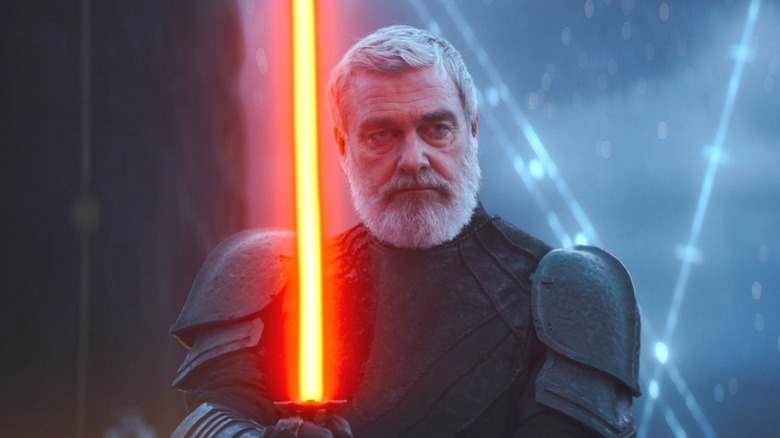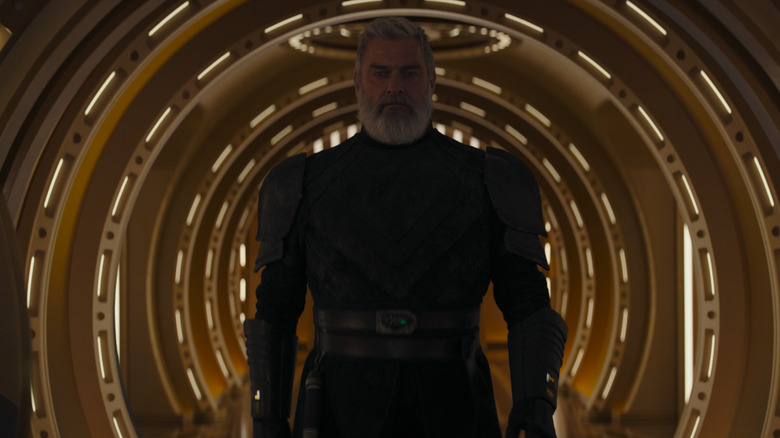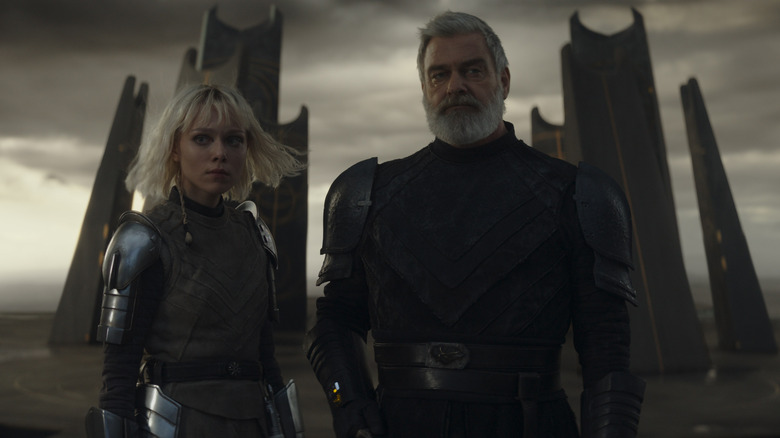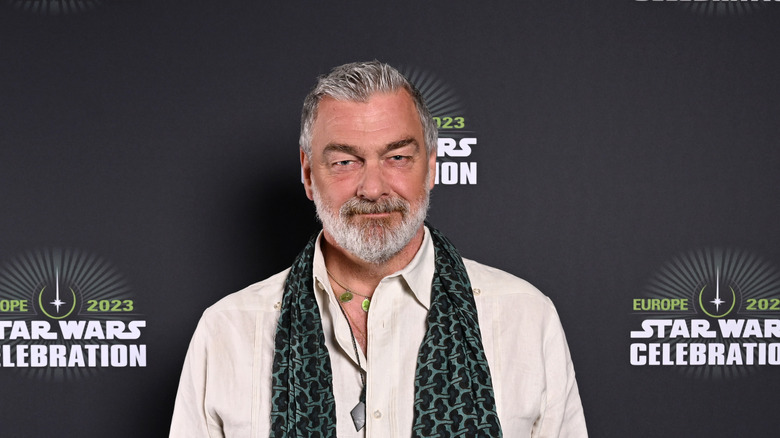Ahsoka Theory: Baylan Skoll Isn't From The Star Wars Galaxy - He's From Ours
Contains spoilers for "Ahsoka" Season 1, Episode 7 — "Part Seven: Dreams and Madness"
Even with the deep pool of familiar "Star Wars Rebels" faces to draw from, "Ahsoka" can't operate with familiar characters alone. The most prominent newcomers in the series are Lord Baylan Skoll (Ray Stevenson) — a former Jedi who has grown disillusioned with his former order – and his apprentice, Shin Hati (Ivanna Sakhno).
Skoll might be a brand-new antagonist, but he's already established himself as one of the most well-informed characters in the franchise. He radiates melancholy and deep wisdom that's present in his every action. In Episode 7, he recaps the original and prequel "Star Wars" trilogies and essentially telegraphs the sequel movies as he laments the repetitive nature of the fight between good and evil. He also reveals his hidden mission to uncover some unseen power that will finally break the eternal cycle of violence, which implies that he's playing every other character like a violin to further his own agenda.
Skoll cuts an impressive figure who can do it all and seems to know far more than anyone else. He's almost too good at what he does to be true. What if all of this is more than just character-crafting? What if Dave Filoni created Skoll as a sort of wish fulfillment character for the audience — one that not only does what every "Star Wars" fan would do if they were sucked into the franchise but actually secretly hails from our world and is drawing his knowledge from the "Star Wars" media he has consumed before ending up in the show somehow?
Of course, it's highly unlikely that "Ahsoka" has introduced a "Star Wars" fanboy from Earth who's living his best life in the galaxy far, far away while barely managing to refrain from breaking the fourth wall. Even so, the evidence supporting this admittedly far-out theory is oddly convincing.
Baylan Skoll is a walking cheat code
The more you look at Baylan Skoll, the more suspiciously he starts to resemble a "Star Wars" fan who has somehow managed to enter the realm of fiction with his real-world knowledge intact and create a character that's as awesome as humanly possible. He has a deep connection to the Force. He's a wise, brooding "tall, dark stranger" type with a dramatic backstory and combat skills that — as his hallway fight scene in Episode 1 shows — he's clearly lifted from Darth Vader (Hayden Christensen). His costume combines elements of the coolest, most imposing designs in the animated shows and live-action "Star Wars" projects, pauldrons and all. He has a sweet beard and a unique orange lightsaber, and can handily defeat expert duelist Ahsoka Tano (Rosario Dawson) in single combat. He's a fully-trained Jedi, but also dark, mysterious, and extreme — beyond good and evil, but fully capable of lightsaber-battling either when the situation calls for it. In other words, he's the exact kind of overpowered character a "Star Wars" fan might create for himself if they had to actually live in the universe.
The fact that Skoll recognizes the circular nature of "Star Wars" storytelling insinuates that he's aware of the inner workings of the galaxy and its history in a way that makes famously intelligent characters like Yoda (Frank Oz) and Palpatine (Ian McDiarmid) look like amateur hour. Even when he interacts with the infamously bright Thrawn (Lars Mikkelsen), he doesn't exactly come across as the inferior mind. Combine all this with the fact that the Dark Jedi has his own agenda that revolves around a power no one else seems to be aware of, and he starts to look a whole lot like a dude who knows the entire Wookieepedia off by heart and isn't afraid to use said knowledge.
Skoll keeps inserting real-life quotes in his conversations
Perhaps the most damning evidence in support of this theory is the simple fact that Skoll — a character who lived a long time ago in an entirely different galaxy, like everyone else in "Star Wars" — somehow seems to be aware of Earth's culture. In "Ahsoka" Episode 7, he drops the line, "Impatience for victory guarantees defeat." This is a direct quote from a 17th-century French king, Louis XIV. It's not the only time Skoll has inserted some stealthy Earth wisdom in his conversations, either — in Episode 4, he paraphrases artist Pablo Picasso.
This is the sort of thing someone who's aware of the real world but exists in-universe might be tempted to do. After all, no one else in the "Star Wars" franchise knows about Earth culture, which would enable them to pass classic quotes as nuggets of their own wisdom. Oh, and speaking of drawing inspiration from the real world, Skoll and Hati are named after two powerful wolves in Norse mythology ... which, let's face it, is a source a superfan might very well draw inspiration from in their search for cool "Star Wars" names for himself and his loyal apprentice.
Even Skoll's mission to break the story cycle fits in with the fanboy theory. It's like he's grown bored with the same old "Star Wars" battle between good and evil, and is trying to insert his own fan fiction in the story.
Skoll might not actually be a Star Wars fan, but his actor certainly appreciated the franchise
Of course, the character of Skoll almost certainly isn't a "Star Wars" fan who somehow ended up in his favorite fictional universe and passes the time by tearing through the story with his massively overpowered custom character. Even so, there's a small grain of truth to Skoll being a real-life superfan — thanks to his actor. Ray Stevenson, who tragically passed away at the age of 58 before the release of "Ahsoka," told The Wrap that he had his share of massive fan moments while filming the show.
"Somebody hands me the lightsaber, and then some guy turns it on. And, of course, you make the noise 'vvvrrrrmm vvvrrrrmm' because you can't help it," Stevenson described the experience. "And then the beauty of it is that when you do the training and you get on the set and you're fighting with Ahsoka — and she's got two [lightsabers] and they're flashing everywhere — and then you pinch yourself. And you go, 'I'm actually doing this'."



